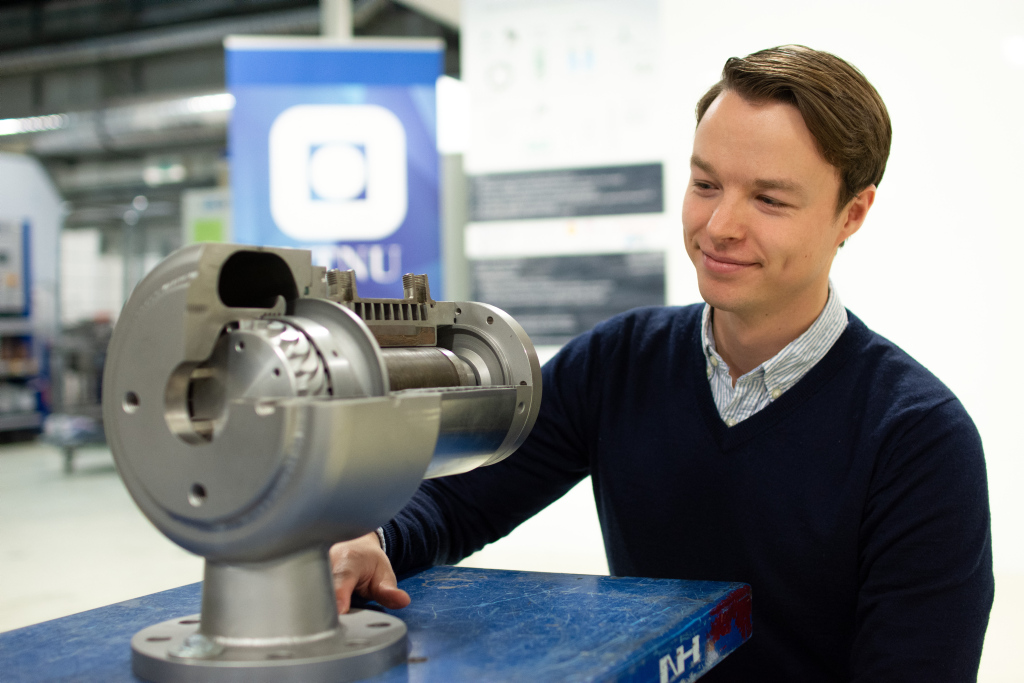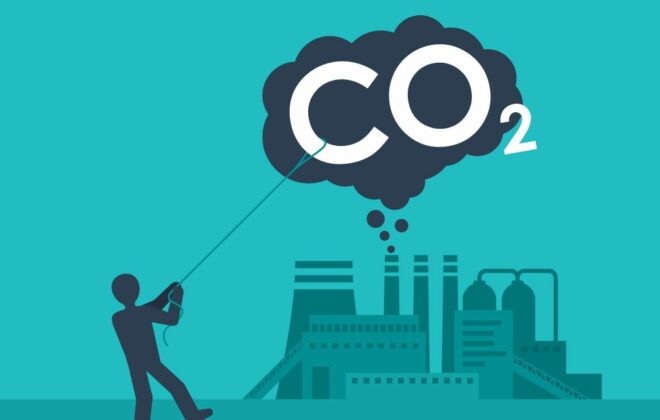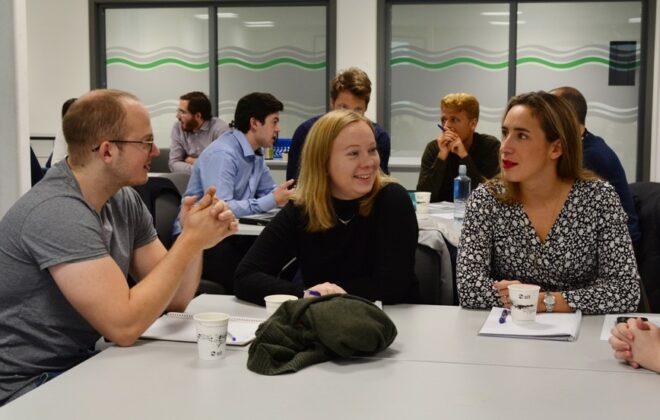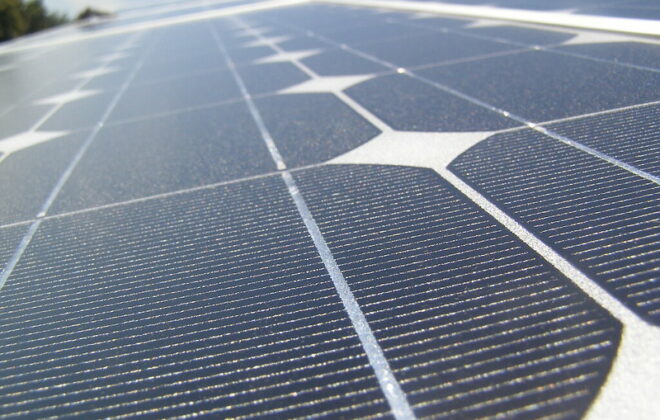How do we go from waste heat to electrical power, the turbine edition

Research on a certain turbine in a cycle that convert heat into electrical power, may in time contribute to developing cost-effective turbines. This is a stepping stone in increasing the return on renewable energy sources.
My research concerns a certain component in a cycle that convert heat into electrical power, namely an axial turbine in an organic rankine cycle (ORC). For now, the turbine in these cycles performs poorly when the heat source is of moderate temperatures (100-400 degree Celsius), and we would like to change this.
Combining testing and numerical methods
My research will include both experimental work and numerical modelling. We have just received a new rig here at NTNU, which we will use to test an axial turbine. See video below:
The tweet text below says: «We have been waiting for this: 4,4 tonnes is lifted one floor up in Varmetekniske laboratorier at @NTNU. The rig will help the researchers find out more about how to use waste heat to make electricity. Related to the infrastructure project HighEFF.»
Dette har vi ventet på: 4,4 tonn løftes opp en etasje i Varmetekniske laboratorier på @NTNU. Riggen skal hjelpe forskerne å finne ut mer om hvordan vi kan bruke spillvarme til å lage strøm. Relatert til infrastrukturprosjektet HighEFF @HighEFF_FME 📷: Lars O. Nord/NTNU pic.twitter.com/tOwchJilXO
— NTNU_EPT (@eptntnu) November 16, 2021
The experimental work is thought to focus on behavior of the turbine at off-design conditions, and then check how this coincide with the numerical model developed. I already have a numerical model from a previous PhD, that gives an optimized design of a turbine under given conditions. The plan is to develop this code to estimate efficiency under off-design conditions, and possibly give an optimized design for a range of operating conditions.
We have too little information on these types of turbines
Experimental work is important to increase the quantity of available data on turbines in ORCs, which can be considered as slim. At least when looking at off-design performance. This can be used to tune loss models used for numerical modelling, thus increasing the accuracy of such models. The last topic, namely to give an optimized design for a range of operating conditions could help to provide a better turbine over an annual time perspective rather than just under one operating condition.

Renewable energy and heat recovery
This work is a part of a project which aims to develop cost-effective turbines for power system (DEXPAND). In this way, it could get more profitable to acquire such systems and to utilize more waste heat. Other proposed applications are geothermal energy, solar energy and biomass combustion. Consequently, if the project accomplishes its goals, it could contribute to increase the return on renewable energy sources in addition to recover heat from industrial processes.
More about me
Before starting my PhD, I finished my masters in energy and environmental engineering here at NTNU. The topic of my master was quite different, as it concerned electrolysis of liquid ammonia, but it was nevertheless a good experience. I am not from Trondheim but from a village called Moelv, between Lillehammer and Hamar.

Lasse Borg Anderson
Lasse Borg Anderson is PhD candidate at NTNU - Energy and Process Engineering since August 2021. His work is affiliated with the DEXPAND project, which is a collaboration between NTNU, Czech Technical University in Prague (CTU), SINTEF Energy and GT progress.
Lasse Borg Anderson
Search
Søk
Categories
- Arctic Research
- Arkitektur
- Bærekraft
- Bioingeniørfag
- Biologi
- Biology
- Biomedical Laboratory Science
- Biotechnology
- Bioteknologi
- Chemical Engineering
- Chemistry
- Climate
- Computer Science
- Datateknologi
- Digital
- Elektronikk
- Energi
- Energi
- Energy
- Engineering
- Engineering
- Environment
- Food Science
- Forskning
- Fysikk
- Fysikk
- Havbruk
- Informasjonsteknologi
- Informasjonsteknologi
- Ingeniørvitenskap
- Kjemi
- Kjemisk prosessteknologi
- Kjemisk prosessteknologi
- Kreftbehandling
- Kybernetikk
- Marine Technology
- Materialer
- Materials Science
- Materialteknologi
- Matvitenskap
- Meninger
- Miljø
- Min ph.d.
- My PhD
- My PhD
- My postdoc
- Nanotechnology
- Nanoteknologi
- Ocean
- Oil and gas
- Physics
- Research
- Simulering og visualisering
- Spør en forsker
- Studentliv
- Sustainability
- Ukategorisert
- Universitetsliv
- University Life
Kategorier
- Arctic Research
- Arkitektur
- Bærekraft
- Bioingeniørfag
- Biologi
- Biology
- Biomedical Laboratory Science
- Biotechnology
- Bioteknologi
- Chemical Engineering
- Chemistry
- Climate
- Computer Science
- Datateknologi
- Digital
- Elektronikk
- Energi
- Energi
- Energy
- Engineering
- Engineering
- Environment
- Food Science
- Forskning
- Fysikk
- Fysikk
- Havbruk
- Informasjonsteknologi
- Informasjonsteknologi
- Ingeniørvitenskap
- Kjemi
- Kjemisk prosessteknologi
- Kjemisk prosessteknologi
- Kreftbehandling
- Kybernetikk
- Marine Technology
- Materialer
- Materials Science
- Materialteknologi
- Matvitenskap
- Meninger
- Miljø
- Min ph.d.
- My PhD
- My PhD
- My postdoc
- Nanotechnology
- Nanoteknologi
- Ocean
- Oil and gas
- Physics
- Research
- Simulering og visualisering
- Spør en forsker
- Studentliv
- Sustainability
- Ukategorisert
- Universitetsliv
- University Life



